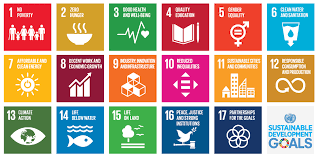Sustainable Development Goals – Strategies in Europe
 The 2030 Agenda for Sustainable Development, adopted by all United Nations Member States in 2015, provides a shared blueprint for peace and prosperity for people and the planet, now and into the future.
The 2030 Agenda for Sustainable Development, adopted by all United Nations Member States in 2015, provides a shared blueprint for peace and prosperity for people and the planet, now and into the future.
At its heart are the 17 Sustainable Development Goals (SDGs), which are an urgent call for action by all countries - developed and developing - in a global partnership.
They recognize that ending poverty and other deprivations must go hand-in-hand with strategies that improve health and education, reduce inequality, and spur economic growth – all while tackling climate change and working to preserve our oceans and forests.
The project Waterschool contributed to several of these 17 SDGs:
-
Goal 3: Good Health and Well-Being - Ensuring healthy lives and promoting the well-being at all ages is essential to sustainable development. This concerns not only people of the South but also children and kids in Europe and the absolute need for healthier food and drinking, promoted by Waterschools.
-
Goal 6: Clean Water and Sanitation - Clean, accessible water for all is an essential part of the world we want to live in and there is sufficient fresh water on the planet to achieve this. However, due to bad economics or poor infrastructure, millions of people including children die every year from diseases associated with inadequate water supply, sanitation and hygiene.
-
Goal 11: Sustainable Cities and Communities - With the number of people living within cities projected to rise to 5 billion people by 2030, it’s important that efficient urban planning and management practices are in place to deal with the challenges brought by urbanization. Quality of drinking water and reduce of waste are essential issues, focused by the Waterschool project.
-
Goal 12: Responsible consumption and production - Sustainable consumption and production is about promoting resource and energy efficiency, sustainable infrastructure, and providing access to basic services, green and decent jobs and a better quality of life for all. A central sub-goal is the availability and use of fresh drinking water, also for children in Europe – a main intention of Waterschool project.
More information: https://www.un.org/sustainabledevelopment/sustainable-development-goals
Here you can find a quiz in SDGs of WHO:
Test your knowledge of SDGs
The EC Member States decided to launch a process to develop a set of Sustainable Development Goals (SDGs) at the Rio+20 Conference. These goals were to build upon the Millennium Development Goals and converge with the post 2015 development agenda.
On 25 September 2015, the United Nations General Assembly formally adopted the universal, integrated and transformative 2030 Agenda for Sustainable Development, along with a set of 17 SDGs and 169 associated targets.
The adoption of the 2030 Agenda and its SDGs represent a change of paradigm of the international policies on development cooperation. The EU has committed to implement the SDGs both in its internal and external policies.


